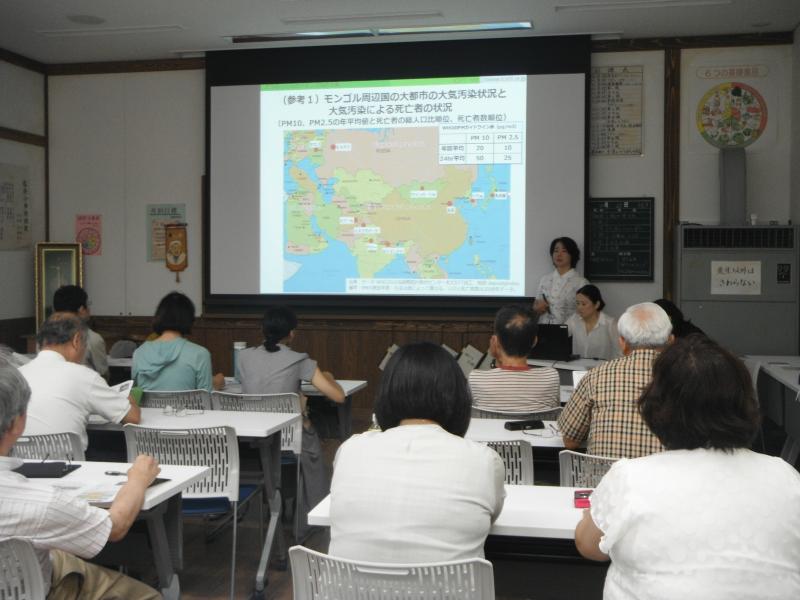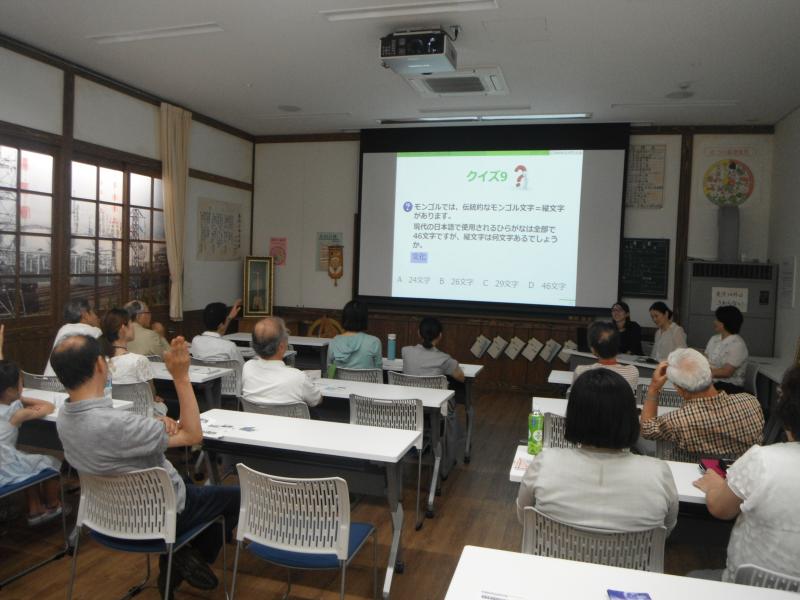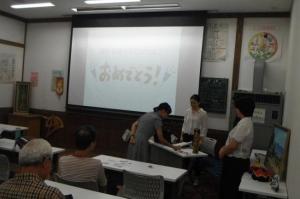Home > Information Dissemination and Awareness-raising > Fiscal Year 2016 > Course Held on Air Pollution in Mongolia and Assistance by ICETT
Main content starts here.
Update:September 16, 2016
Course Held on Air Pollution in Mongolia and Assistance by ICETT
As an Eco Partner organization, ICETT offered a Yokkaichi-commissioned course for local residents to learn about the environment.
Date: Saturday, July 16, 2016
Venue: Practice Room (1st Floor) at Yokkaichi Pollution and Environmental Museum for Future Awareness
(Yokkaichi Municipal Museum)
Title: “Let’s See How the Air Quality is in Mongolia?” – Air pollution control example cases in Mongolia
In February 2016, ICETT has conduct the first “Eco Partner Course on the International Environment – Views from ICETT’s global environmental protection activities” which is a comissioned project by Yokkaichi City Government. The participants learned about ICETT’s international cooperation activities, especially in China.
This time, ICETT held a second Eco Partner Course on the International Environment, which focused on air pollution in Mongolia. The course included presentations on the progress and results of programs that provide assistance to Mongolia through some ICETT's activities and the Mongolian climate and culture.
The topics laid out here are some excerpts from the content of the presentation.

In fiscal 2013, ICETT took part in field surveys in Ulan Bator, the capital of Mongolia. The surveys, commissioned by the Ministry of Economy, Trade and Industry, aimed at reducing air pollution by introducing Japanese biomass boiler systems to the Mongolian city. Biomass boilers burn livestock waste instead of coal.

The participants also listened to explanations about an assistance program, subsidized by the Environmental Restoration and Conservation Agency of Japan, ERCA. From fiscal 2012 to 2014, ICETT had conducted the program to systematically cultivate leaders for environmental protection activities, establish a model area and a model school, and raise awareness of environmental protection among the local residents.
In fiscal 2014, ICETT also organized a training course for ten high school students from Ulan Bator, which was subsidized by Japan Science and Technology Agency (JST; "Sakura Science Plan"). It was part of an environmental protection program based on the experience of the so-called Yokkaichi pollution to help tackle air pollution issues in Mongolia. These teenagers began to recognize the importance of environmental protection as young members of the future generation.

Among the participants in this course, there were high school students, former engineers, and Mongolians. Technical questions were answered and advice was given about the electricity generated by biomass boilers, the gas emissions from power plants, and other related matters. Some of the participants shared experiences they had had in Mongolia, which gave the course an interesting personal touch.
To conclude the course, there was a quiz about daily life in Mongolia. Souvenirs from Mongolia were awarded to the winners. One of the quiz questions was, “When one Mongolian inadvertently hits the leg of another Mongolian, why do they usually shake hands with each other even if they don’t know each other?” It is a custom that helps avoid making enemies. It was explained that an ICETT member on a flight to Mongolia was quite surprised when he was asked to shake hands with a Mongolian after they bumped into each other.

Occasions like these are a perfect opportunity for ICETT to share information on other countries with participants in its programs. Баярлалаа! (Thank you!)








